Literary Visual and Cultural Studies
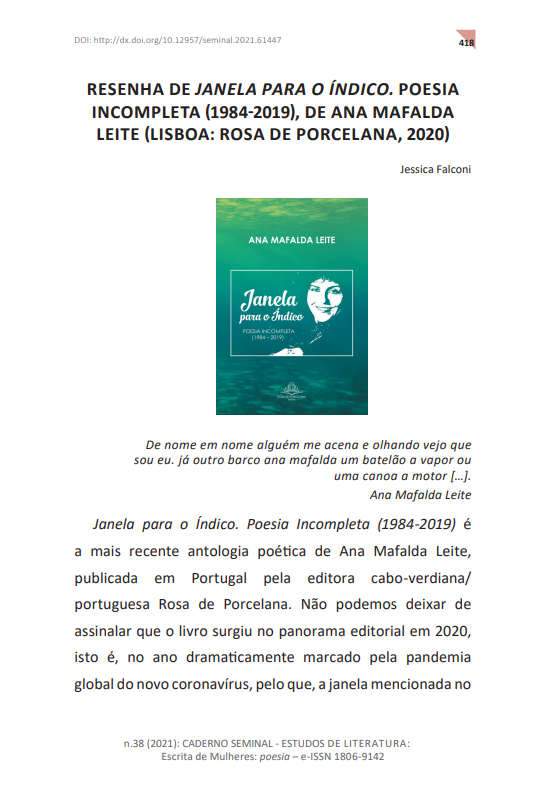
Resenha De Janela Para O Índico. Poesia Incompleta (1984-2019), De Ana Mafalda Leite
Abstract:
Resenha de Janela para o Índico. Poesia Incompleta (1984-2019) focuses on the most recent poetic anthology by Ana Mafalda Leite, published in Portugal by the Cape Verdean/Portuguese publishing house Rosa de Porcelana. We cannot fail to point out that the book appeared on the publishing scene in 2020, that is, in the year dramatically marked by the global pandemic of the new coronavirus, so the window mentioned in the title acquired an even more suggestive sense of freedom and openness. The anthology is organised into nine sections, which correspond to the books previously published by the author, from which a wide and careful selection was made, and a section with two unpublished texts. Thus, this Window witnesses a path of thirty-five years of poetic writing. A journey that is parallel to an equally long and consolidated career as a teacher and scholar of literature and cinema from the five Portuguese-speaking African countries. It is worth mentioning that Ana Mafalda Leite’s poetic writing has been the object of growing appreciation and recognition by the critics and the public. Her poetic texts have been included in various academic publications – in addition to anthologies and literary magazines – such as Itinerâncias and Vozes femininas de África, among others. In 2015 she was awarded the Femina1 prize for her poetic production, and in 2011 her poems were translated into English and published in the volume Stained Glass. Poetry from the Land of Mozambique, organized by Luís Rafael Mitras. It should also be noted that a selection of poems, from Janela para o Índico, will soon be published in Italian translation, on the initiative of Roberto Francavilla.
Quotation:
Falconi, J. (2021). Resenha De Janela Para O Índico. Poesia Incompleta (1984-2019), De Ana Mafalda Leite, Caderno Seminal 38.1, p. 418-443

Literatures and Cultures of the Indian Ocean
Abstract:
Portuguese Studies is a biannual multi-disciplinary journal dedicated to research on the cultures, literatures, history, and societies of the Lusophone world. Ana Mafalda Leite, Elena Brugioni, and Jessica Falconi were the organizers of this issue of the journal, Literatures and Cultures of the Indian Ocean. The president of the Editorial Board for 2021 is Catarina Fouto, and the Journals editor is Emanuelle Rodrigues Dos Santos. The journal is published by the Modern Humanities Research Association (MHRA), an international organization with members in all parts of the world. The aim of the Association is to encourage and promote advanced study and research in the field of modern humanities. It is concerned to break down barriers between scholars working in different disciplines and to maintain the unity of humanistic scholarship in the face of increasing specialization. The present volume results frorn the scholarly work conducted by members of the research project NILUS — Narratives Ofthe Indian Ocean in the Lusophone Space. The main purpose of the project consisted in establishing a theoretical and disciplinary connection between Lusophone Literary, Visual and Cultural Studies and the transdisciplinary field Of Indian Ocean Studies. The project on the written and visual narratives hailing from, or related to, the territories formerly colonized by Portugal along the Indian Ocean, specifically Mozambique, Goa, and East Timor. This volume, therefore, constitutes an attempt to bridge a significant critical and disciplinary gap, motivated by an almost total lack of dialogue among the above-mentioned fields of study. This lack of dialogue becomes ever more apparent if we bear in mind the increasingly central role played by historical, anthropological, literary, and cultural studies of the Atlantic Ocean in addressing colonial and postcolonial cultural and identity-related outputs and relations from the territories that Out Of Portuguese colonial rule. Consider, for instance, the influence of the notion of Brown Atlantic (Atlântico Pardo), de,’eloped by the anthropologist Miguel Vale de Almeida as a counterpoint to Paul Gilroy’s Black Atlantic, or the use of the Portugal -Brazil-Angola triangulation in comparative and transnational- oriented literary and cultural studies.4
Quotation:
Leite, A.M.; Brugioni, E. & Falconi, J. (2021) (eds). “Literatures and Cultures of the Indian Ocean”, Portuguese Studies 37.2.

Enchanted Things to Narrate the Oceans: João Paulo Borges Coelho and Luís Cardoso
Abstract:
Enchanted Things to Narrate the Oceans: João Paulo Borges Coelho and Luís Cardoso stems from the research developed under the NILUS project and, in particular, falls within the research strand that explored the role of material culture and materiality in contemporary narratives of the Lusophone Indian Ocean. The paper focuses on the short story ‘O Pano Encantado’ (2005) by João Paulo Borges Coelho and the novel Requiem para o Navegador Solitário (2007) by Luís Cardoso – two narratives set in island spaces, the small island of Mozambique and the island of Timor, respectively. It aims to validate the hypothesis that the appeal to material culture and materiality offers a way of narrating and remembering (in) the Indian Ocean from different shores of its range. The article was produced for the Modern Humanities Research Association (MHRA), an international organization with members in all parts of the world. The aim of the Association is to encourage and promote advanced study and research in the field of modern humanities. It is concerned to break down barriers between scholars working in different disciplines and to maintain the unity of humanistic scholarship in the face of increasing specialization.
Quotation:
Falconi, J. (2021). Enchanted Things to Narrate the Oceans: João Paulo Borges Coelho and Luís Cardoso. Portuguese Studies, 37(2), 224–241. https://doi.org/10.5699/portstudies.37.2.0224
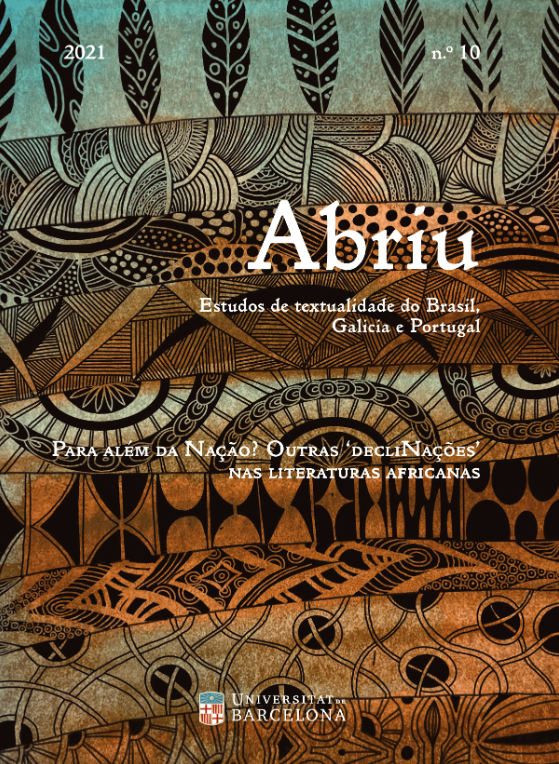
Beyond Nationhood: Other ‘Declensions’ in African Literatures
Abstract:
In the last two decades, Portuguese-speaking African literature, as a field of critical inquiry and object of academic study,1 has been undergoing a great expansion, with numerous dissertations, monographs, conference proceedings, special issues of journals, and articles produced in several countries. The article Beyond Nationhood: Other ‘Declensions’ in African Literatures traces the evolution of the national perspective in the studies of Lusophone African Literatures from the 1980s to the present. Based on a selection of collective and individual publications, as well as highlighting impor tant academic events for the area, the article seeks to identify lines of continuity and moments of rupture in the approach of these literatures based on the idea of Nation as a critical category and unity of analysis, from the consolidation of the link between literature and national independence affirmed after decolonization until the reception of post-colonial theories which occurred in the mid-1990s. Also, the article looks at the theoretical and disciplinary articulations between African Literature, Postcolonial Studies, Indian Ocean Studies and Comparative Litera tures, to provide a possible mapping of the most recent approaches that seek to build new critical cartographies for the studies of these literatures.
Quotation:
Falconi, J. (2021). Beyond Nationhood: Other ‘Declensions’ in African Literatures. Abriu: Estudos De Textualidade Do Brasil, Galicia E Portugal, (10), 9–38. https://doi.org/10.1344/abriu2021.10.1

Literatura colonial de autoria feminina: O Último Batuque, de Maria do Céu Coelho
Abstract:
Portuguese colonial literature written by women has received little attention in Lusophone literary and cultural studies. The most relevant exception, in this regard, is the case of Maria Archer, author of a significant number of fiction and non-fiction texts of colonial setting and theme that have received diverse readings and analyses. In particular, Ferreira’s works on women’s authorship writing and the connections between gender, nation and empire were pioneers in approaching this production according to an integrated theoretical framework, capable of illuminating material and symbolic transits and identity reverberations between nation and empire, in line with the paradigms of colonial and feminist historiography of the 1990s. Literatura colonial de autoria feminina: O Último Batuque, de Maria do Céu Coelho, aims to deepen and broaden the knowledge of Portuguese women’s writing on colonial themes, by providing a reading of the book O último batuque (1963) by Maria do Céu Coelho, published in Mozambique in the early 1960s. It is a singular work, for focusing on the eminently masculine topic of hunting from a woman’s perspective, and also for being a hybrid book that combines memorialistic writing and short novellas about the rural universe of colonial Mozambique. The paper discusses some of the essential characteristics of Portuguese colonial literature, as it has been conceptualized by several authors in previous studies. Resorting also to the vast literature on the articulations between gender, empire, and colonialism, the article seeks to equate the author’s position in the corpus of colonial literature, as well as to reflect on how her literary writing articulates race and gender.
Quotation:
Falconi, Jessica (2021) “Literatura colonial de autoria feminina: O Último Batuque, de Maria do Céu Coelho,” Portuguese Cultural Studies: Vol. 7: Iss. 1, Article 4.
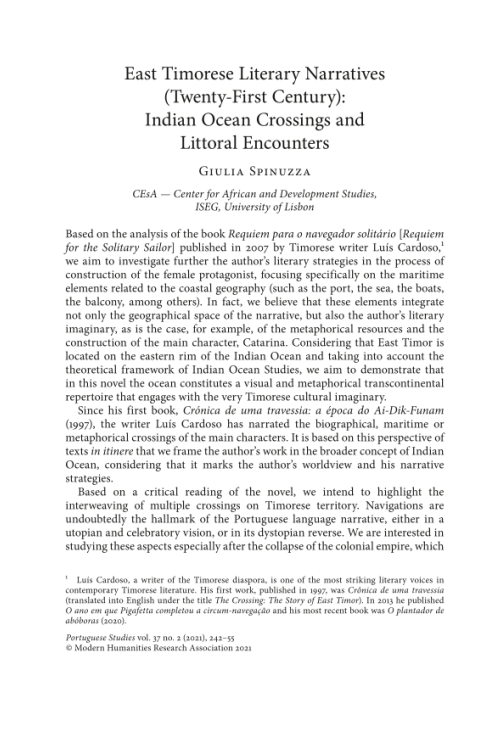
East Timorese Literary Narratives (Twenty-First Century): Indian Ocean Crossings and Littoral Encounters
Abstract:
The aim of East Timorese Literary Narratives (Twenty-First Century): Indian Ocean Crossings and Littoral Encounters is to analyze the book Requiem para o Navegador Solitário (2007) [Requiem for the Lonely Sailor] by Luís Cardoso considering the maritime elements that emerge in the novel and combining Indian Ocean Studies with Gender Studies. Pointing to the Timorese imaginary and the female protagonist’s perspective, we will focus on the elements related to the island’s coast, such as the shore, the sea, ships, sailors, and the interconnection with other islands and territories during the colonial period. In fact, we believe that these elements integrate not only the geographical space of the narrative, but also the literary imaginary, as is the case, for example, of the metaphorical resources and the construction of the main character, Catarina. Considering that East Timor is located at the eastern edge of the Indian Ocean and taking into account the theoretical theory of Indian Ocean Studics, we intend to demonstrate that in this novel the ocean constitutes a visual and metaphorical transcontinental repertoire that relates to the Timorese cultural imaginary itself. We will analyze the connection between the existential trajectory of Catarina, the novel’s female protagonist, the history of East Timor and the Indian Ocean crossings. This text, written in Portuguese by a Timorese author, portrays the complex history of this territory during World War II and offers a unique perspective on Timorese history.
Quotation:
Spinuzza, G. (2021). East Timorese Literary Narratives (Twenty-First Century): Indian Ocean Crossings and Littoral Encounters. Portuguese Studies 37(2), 242-255. doi:10.1353/port.2021.0017.
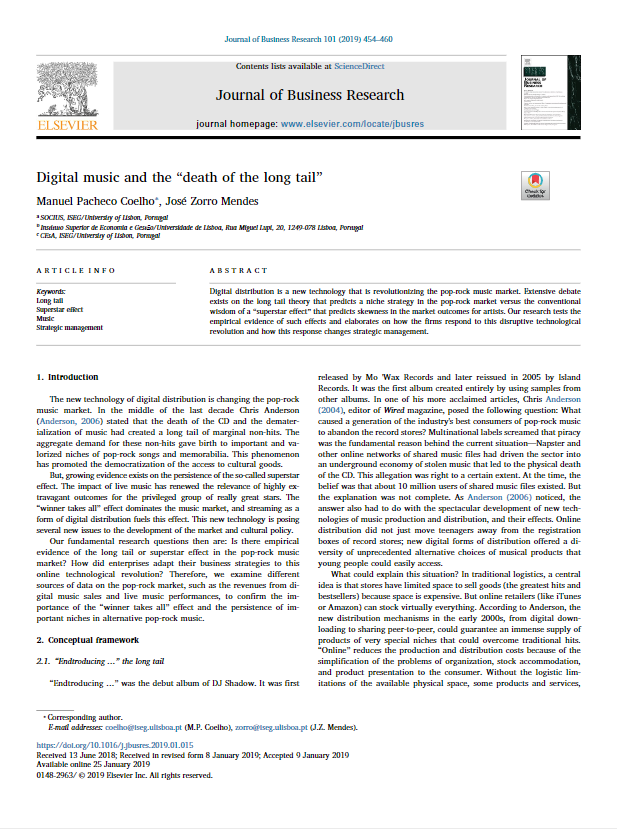
Digital music and the “death of the long tail”
Abstract:
The new technology of digital distribution is changing the pop-rock music market. In the middle of the last decade Chris Anderson (Anderson, 2006) stated that the death of the CD and the dematerialization of music had created a long tail of marginal non-hits. The aggregate demand for these non-hits gave birth to important and valorized niches of pop-rock songs and memorabilia. This phenomenon has promoted the democratization of the access to cultural goods. But, growing evidence exists on the persistence of the so-called superstar effect. The impact of live music has renewed the relevance of highly extravagant outcomes for the privileged group of really great stars. The “winner takes all” effect dominates the music market, and streaming as a form of digital distribution fuels this effect. This new technology is posing several new issues to the development of the market and cultural policy. Our fundamental research questions then are: Is there empirical evidence of the long tail or superstar effect in the pop-rock music market? How did enterprises adapt their business strategies to this online technological revolution? Therefore, in Digital music and the “death of the long tail”, we examine different sources of data on the pop-rock market, such as the revenues from digital music sales and live music performances, to confirm the importance of the “winner takes all” effect and the persistence of important niches in alternative pop-rock music.
Quotation:
“Coelho, M., Mendes, Z. (2019). “Digital music and the “death of the long tail”. Journal of Business Research, 101, 454-460. https://doi.org/10.1016/j.jbusres.2019.01.015“
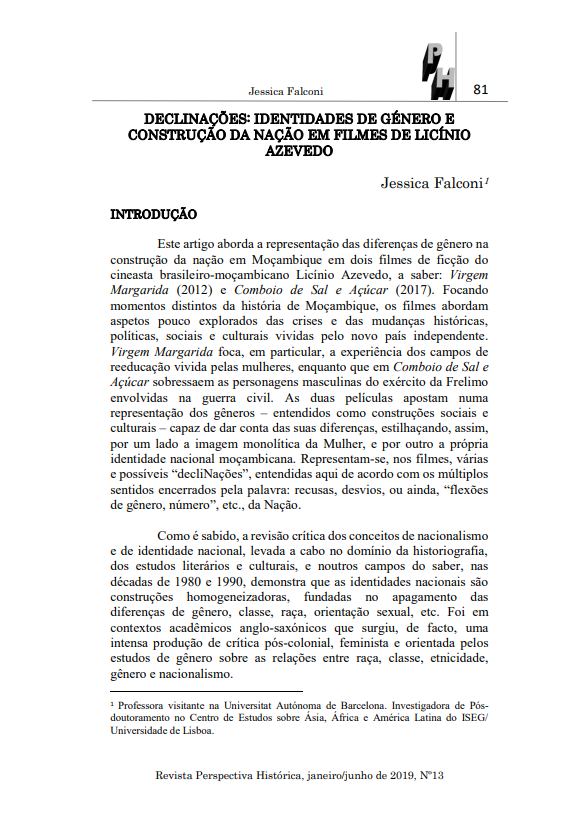
Declinações: Identidades de Género e Construção da Nação em Filmes de Licínio Azevedo
Abstract:
Declinações: Identidades de Género e Construção da Nação em Filmes de Licínio Azevedo addresses the representation of gender differences in nation building in Mozambique in two fiction films by Brazilian-Mozambican filmmaker Licínio Azevedo, namely: Virgem Margarida (2012) and Comboio de Sal e Açúcar (2017). Focusing on different moments in the history of Mozambique, the films address little explored aspects of the crises and the historical, political, social and cultural changes experienced by the new independent country. Virgem Margarida focuses, in particular, on the experience of the re-education camps lived by women, while in Comboio de Sal and Açúcar the male characters of the Frelimo army involved in the civil war stand out. The two films bet on a representation of the genders – understood as social and cultural constructions – able to account for their differences, thus shattering, on the one hand, the monolithic image of women, and on the other, the Mozambican national identity itself. The films represent several possible “decliNations”, understood here in accordance with the multiple meanings of the word: refusals, deviations, or even “flexions of gender, number”, etc., of the Nation.
Quotation:
Falconi, J. (2019). Declinações: Identidades de Género e Construção da Nação em Filmes de Licínio Azevedo. Perspectiva Histórica 13: 81-105. http://www.perspectivahistorica.com.br/revistas/1563933990.pdf“
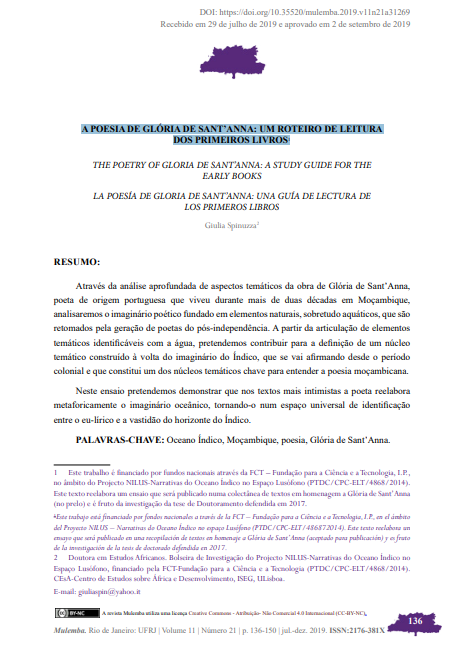
A poesia de Glória de Sant’anna: um roteiro de leitura dos primeiros livros
Abstract:
Through in-depth analysis of thematic aspects of the work of Glória de Sant’Anna, a poet of Portuguese origin who lived for over two decades in Mozambique, we will analyze in A poesia de Glória de Sant’Anna: um roteiro de leitura dos primeiros livros the poetic imaginary based on natural elements, especially aquatic, which are resumed by the generation of post-independence poets. Through the articulation of thematic elements identifiable with water, we intend to contribute to the definition of a thematic core built around the imaginary of the Indian Ocean, which has been asserting itself since the colonial period and which constitutes one of the key thematic cores for understanding Mozambican poetry. In this essay, we intend to demonstrate that in the most intimate texts, the poet metaphorically reworks the oceanic imaginary, turning it into a universal space of identification between the lyric self and the vastness of the Indian Ocean horizon. This work is financed by national funds through FCT – Fundação para a Ciência e a Tecnologia, I.P., under the NILUS-Narratives of the Indian Ocean in the Lusophone Space Project (PTDC/CPC-ELT/4868/2014). This text reworks an essay that will be published in a collection of texts in tribute to Glória de Sant’Anna (in press) and is the result of the research of the PhD thesis defended in 2017.
Quotation:
“Spinuzza, Giulia. A poesia de Glória de Sant’Anna: um roteiro de leitura dos primeiros livros. Mulemba, UFRJ, Brasil, vol. 11, n. 21, Dezembro 2019, p. 136 https://revistas.ufrj.br/index.php/mulemba/issue/view/1302/showToc”
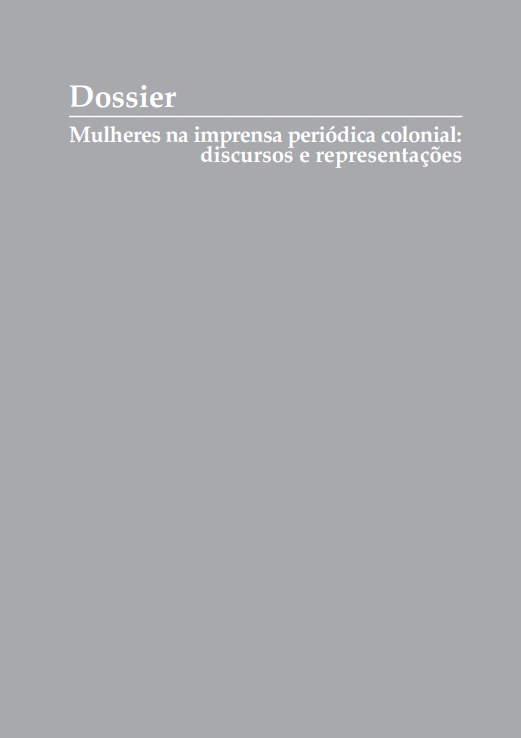
Entre silêncios e interferências: mulheres na imprensa colonial
Abstract:
In Entre silêncios e interferências: mulheres na imprensa periódica colonial we adress the presence of women in the colonial periodical press of the former Portuguese Empire means trying to define, even if only provisionally, the main aspects of the “object” of reflection proposed in the present dossier. Firstly, by proposing a joint approach, under the term “colonial”, of the periodical press published both in the former metropolis and in the various spaces colonised by Portugal, we point to some perspectives of the historiography on European colonialisms which have been shattering polarized visions, analysing the social and political reverberations between metropolis and colonies, the transits of ideas and imaginaries, as well as the “manufactured” dimension of the difference (Burton 1994; Cooper and Stoler 1997). The dossier results from the panel “The ‘women’ and the colonial periodical press” organized in the framework of the International Congress Politics and Culture in the Colonial Periodical Press, which took place from 22 to 25 May 2017, near the CHAM-Centre of Humanities of the New University of Lisbon, in partnership with the CEI-IUL-Centre of International Studies of ISCTE-Instituto Universitário de Lisboa and the CEC-Centre of Comparative Studies of the Faculty of Letters of the University of Lisbon. The Congress was an initiative of the International Study Group of the Colonial Periodical Press of the Portuguese Empire, created by Sandra Ataíde Lobo (CHAM-UNL), Adelaide Vieira Machado (CHAM-UNL) and Cátia Miriam Costa (CEI-IUL). Various entities and researchers from different research centres have joined the Group.
Quotation:
“Falconi, J.; Wieser, D. (2019). Entre silêncios e interferências: mulheres na imprensa periódica colonial, Revista ex aequo- Revista da Associação Portuguesa de Estudos sobre as Mulheres, n. 39. https://doi.org/10.22355/. exaequo.2019.39.01.10.22355/”





